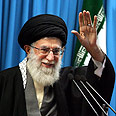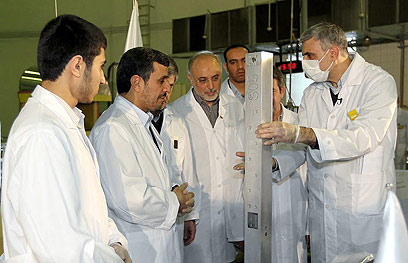
Report: CIA, Mossad face 'tricky intel task' in Iran
'Iran is the hardest intelligence target there is. It is harder by far than North Korea,' US officials tells New York Times. Report claims Israel has advantage in gathering intel on the ground regarding nuclear weapons program with the help of Kurds and exile group
WASHINGTON – American officials have acknowledged "significant intelligence gaps" in understanding the intentions of Iran’s leaders and whether they would approve the necessary steps toward engineering a nuclear bomb, the New York Times reported over the weekend.
The newspaper quoted American intelligence officials as saying that intercepted communications of Iranian officials discussing their nuclear program raised concerns that the Islamic Republic's leaders had decided to jumpstart efforts to develop a weapon.
Related articles:
- Op-ed: Obama is bluffing on Iran
- Iran rebukes Azeri envoy over terror plot
- WikiLeaks: Israel destroyed nuclear facilities in Iran
"That, along with a stream of other information, set off an intensive review and delayed publication of the 2010 National Intelligence Estimate," according to the report. The most recent American intelligence assessments have determined that Iran had halted its efforts to develop nuclear weapons in 2003.
"The intelligence crisis that erupted in 2010, which has not been previously disclosed, only underscores how central that assessment has become to matters of war and peace," the NYT report stated.
"Today, as suspicions about Iran’s nuclear ambitions have provoked tough sanctions and threats of military confrontation, top administration officials have said that Iran still has not decided to pursue a weapon, reflecting the intelligence community’s secret analysis. But if that assessment changes, it could lift a brake set by President (Barack) Obama, who has not ruled out military options as a last resort to prevent Iran gaining nuclear arms."
According to the report, much of what analysts sift through are shards of information that are ambiguous or incomplete, sometimes not up to date, and that typically offer "more insight about what the Iranians are not doing than evidence of what they are up to."

Ahmadinejad (second from left) at nuclear plant (Photo: EPA)
As a result, NYT reported, officials caution that they cannot offer certainty. "I’d say that I have about 75% confidence in the assessment that they haven’t restarted the program," one former senior intelligence official told the newspaper, while another said: "Iran is the hardest intelligence target there is. It is harder by far than North Korea.
"In large part, that’s because their system is so confusing," he said, which "has the effect of making it difficult to determine who speaks authoritatively on what. We’re not on the ground, and not having our people on the ground to catch nuance is a problem."
Officials said that while Iran says its nuclear program is for peaceful civilian purposes, US intelligence agencies and the International Atomic Energy Agency have gathered evidence in recent years indicating that some Iranian research activities that may be weapons-related have continued since 2003.
"That information has not been significant enough for the spy agencies to alter their view that the weapons program has not been restarted," NYT said.
According to the report, Mossad agrees with the American intelligence assessments, "even while Israeli political leaders have been pushing for quick, aggressive action to block Iran from becoming what they describe as an existential threat to the Jewish state."

'Easier to monitor enrichment.' Plant in Qom
"Their people ask very hard questions, but Mossad does not disagree with the US on the weapons program," one former senior American intelligence official told NYT.
"There is not a lot of dispute between the US and Israeli intelligence communities on the facts."
US officials explained that searching for signs of the resumption of a weapons program is more difficult than monitoring enrichment and missile-building activities, both of which require large investments in plants, equipment and related infrastructure.
The report said the National Security Agency eavesdrops on telephone conversations of Iranian officials and conducts other forms of electronic surveillance, while the National Geospatial-Intelligence Agency analyzes radar imagery and digital images of nuclear sites. Outside analysts believe high-tech drones prowl overhead and gather intelligence, NYT said.
Meanwhile, according to the report, clandestine ground sensors, which can detect electromagnetic signals or radioactive emissions that could be linked to secret nuclear activity, are placed near suspect Iranian facilities. "The United States also relies heavily on information gathered by inspectors with the International Atomic Energy Agency who visit some of Iran’s nuclear-related facilities," the report said.
However, the NYT report claimed, collecting independent human intelligence — recruiting spies — has been "by far the most difficult task for American intelligence."
Some operational lapses — and the lack of an embassy as a base of operations ever since the hostage crisis three decades ago — have frequently left the CIA virtually blind on the ground in Iran, former intelligence officials told the newspaper.
According to the report, for its spying efforts, Israel relies in part on an Iranian exile group that is labeled a terrorist organization by the US, the Mujahedeen Khalq, or M.E.K., which is based in Iraq. The Israelis have also developed close ties in the semiautonomous region of Kurdistan in northern Iraq, and they are believed to use Kurdish agents who can move back and forth across the border into Iran, the report said.
"American intelligence officials, however, are wary of relying on information from an opposition group like the M.E.K., particularly after their experience in Iraq of relying on flawed information provided by the Iraqi National Congress, an exile group run by Ahmad Chalabi," NYT reported.
NYT said the US and Israel share intelligence on Iran, adding that American intelligence analysts still believe the Iranians have not gotten the go-ahead from Supreme Leader Ayatollah Ali Khamenei to restart the nuclear weapons program.
- Receive Ynetnews updates
directly to your desktop















